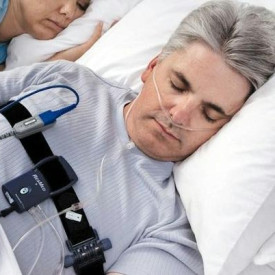Diagnosing Sleep Apnea Fort Worth
Confirm the Cause of Your Restless Nights

Obstructive sleep apnea (OSA) can cause quite a few different symptoms. However, symptoms alone are not enough to arrive at a diagnosis; you need to receive an official diagnosis from a qualified medical professional. What is involved in diagnosing sleep apnea for Fort Worth patients? This page describes some factors that can play a role in identifying the cause of your restless nights.
Medical History

Your medical history will play a key role in helping your care provider determine if you are a victim of sleep apnea. You may be required to complete an extensive form that includes questions about various aspects of your health and medical history, such as:
- Your sleep apnea symptoms, including snoring, insomnia, and daytime drowsiness.
- Whether or not you have a family history of sleep apnea or other sleep disorders.
- Whether you are currently using or have previously used tobacco.
- The typical amount of alcohol you consume.
- Your weight, as obesity is a significant risk factor for sleep apnea.
- Other systemic health conditions that are frequently associated with sleep apnea, such as hypertension and type 2 diabetes.
- Any diagnoses that may affect the health of your airway.
Physical Exam

There are several anatomical factors that might contribute to sleep apnea including your age and BMI. In addition, having a neck circumference larger than 17 inches for men or 16 inches for women could increase your risk. Enlarged tonsils, enlarged adenoids, or a thick tongue might also lead to breathing difficulties during sleep. Furthermore, the alignment and size of your upper and lower jaws play a crucial role in your airway health.
A comprehensive physical examination can pinpoint these anatomical issues, thereby aiding your healthcare team in making an accurate diagnosis.
Ruling Out Other Factors

While certain risk factors for sleep apnea are less common than others, they should still be taken into account during the diagnostic process. For example, hormonal fluctuations can cause sleep problems in some women. Furthermore, the use of opioids and certain medications should be discussed, and a blood test might be necessary to detect their presence.
Additionally, be sure to inform your sleep specialist if you have recently been to an area with an elevation of 6,000 feet or more. The reduced oxygen levels at high altitudes can cause temporary sleep apnea symptoms for several weeks after exposure.
Sleep Testing

If the initial evaluation suggests a high likelihood of sleep apnea, your care provider will recommend a sleep study, a non-invasive diagnostic procedure. Advanced equipment will monitor your sleep overnight, and then a well-trained expert will analyze the data. This will confirm whether you have sleep apnea as well as determine the severity of your condition.
There are two different types of sleep tests. Laboratory tests take place in a sleep clinic and can test for several types of sleep disorders. With an At-home test, you borrow some user-friendly monitoring equipment and undergo the test in the comfort of your own home. This is a simpler approach that can be a reliable way to diagnose sleep apnea. Your care provider can determine which type of test is best for you.
Our Fort Worth team can help you get started on the path to a sleep apnea diagnosis. Get in touch with us today to learn more.
